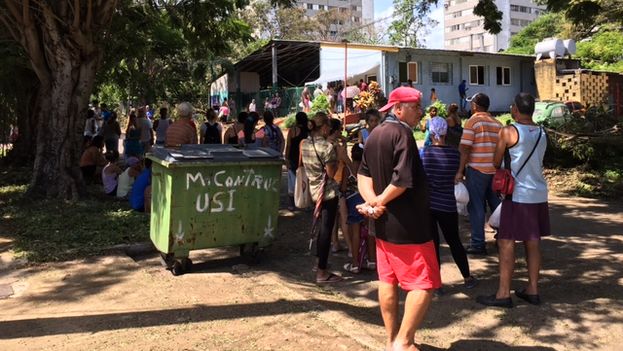
![]() 14ymedio, Reinaldo Escobar, Havana, 14 September 2017 — The passage of the devastating Hurricane Irma along the northern coast of Cuba and the subsequent recovery process have underscored the strength of a powerful state and the fragility of a deprived citizenry.
14ymedio, Reinaldo Escobar, Havana, 14 September 2017 — The passage of the devastating Hurricane Irma along the northern coast of Cuba and the subsequent recovery process have underscored the strength of a powerful state and the fragility of a deprived citizenry.
In each of the 14 provinces affected, from Guantanamo to Artemisa, substantial resources were mobilized almost immediately to restore power and communication networks, to reopen blocked roads and to collect solid waste. Following the order issued from the highest governmental body, priorities were established to restore the accommodation capacity of affected tourist centers and to make hospitals and schools fully operational.
Inside the thousands of houses hit by the fury of the winds or flooded by the penetrations of the sea, the drama unfolds at a different speed. In each of them, insignificant in appearance, are the possessions treasured by a housewife in her kitchen, clothing, mattresses, old furniture inherited from ancestors, appliances, and a long list of personal belongings, acquired through unimaginable sacrifice; everything that was once irreplaceable, has suddenly become unrecoverable.
The almighty state presents itself as generous with what it considers essential, so it “advanced” the monthly quota for the rationed market and sells food “at reasonable prices” in the most vulnerable areas. But speaking in legal terms, the state “does not know” what the citizens obtain through the intricate roads of the black market, nor is it aware of the backpack sent by a relative in Miami, shoes bought in the hard currency market, the television delivered by a mule who traveled from Panama or the computer sold by a neighbor before leaving the country.
Many losses cannot even be declared because of the fear of becoming a confessed recipient of goods acquired by illegal means.
Another aspect that emphasizes the fragility of those affected is the huge difference between the real cost and the legal price of the properties. What the buyer paid for a house or car can be 2000% higher than the value officially recorded for it, so that when quantifying the total damage or destruction, the true damage caused to the victim is never reflected.
In a nation of the dispossessed, the resilience of individuals and families affected by natural disasters depends on what the all-owning state assigns to everyone under the rules of distribution imposed by egalitarianism.
Those who, by one means or another, have achieved economic empowerment do not have a guarantee that assures them prompt reparations for the damages. This emerging middle class, which rose after Raul Castro’s timid reforms, is marked by the concept of self-sufficiency, which means that everyone must face the risks of entrepreneurship as best they can by themselves.
It will soon be reported that the hotels in the keys are even better than they were before Irma passed through, that air-conditioned buses filled with foreigners are already circulating along the causeways, and that all the airports are in service. What will never be known is how many snack bars, repair shops, restaurants and privately rented homes have disappeared.
The power of the state should not rest on the fragility of its citizens.
